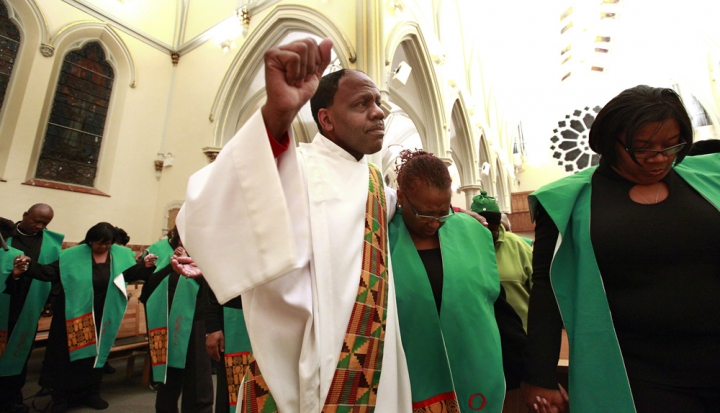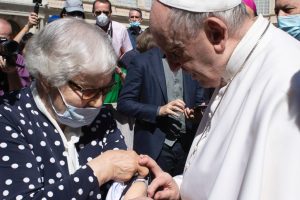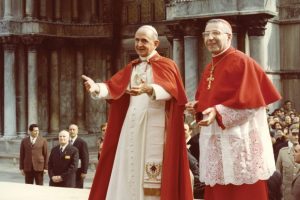In the late summer of 2011, 13-year-old Darius Brown was shot and killed while playing basketball on Chicago’s South Side. It took months before police identified his killers.
Quickly after receiving news of the shooting, Deacon LeRoy Gill jumped in his car and drove to the hospital where Brown was being treated. Sadly, the boy passed away before he was able to reach him.
After Brown’s death the deacon held a memorial for the community—particularly for Brown’s young friends who were coping with the tragedy. “Sometimes adults don’t want to talk about death. We assume that by avoiding the topic of death, young people will be spared some of the pain and sadness,” Gill says. “However, the reality is very simple: Teens grieve anyway. For them, the death of someone loved is a shattering experience. Grief is complex, and adults must communicate to children that this feeling is not one to be ashamed of or to hide.”
Brown’s tragedy was certainly not the first death that affected Deacon Gill, and it will certainly not be the last. For the past 11 years he has served as a deacon in the Archdiocese of Chicago, ministering to families who have been afflicted by the ongoing violence on the South Side.
Since Darius Brown’s fatal shooting in 2011, the homicide rate on Chicago’s South Side has only increased. According to Time magazine, the rate of homicides per 100,000 people has jumped from 15.9 in 2011 to 27.7 in 2016. In fact, Time referred to 2016 as the South Side’s deadliest year yet.
Gill currently serves as a campus minister at the Academy of St. Benedict the African in Chicago’s Englewood neighborhood. As violence in their neighborhood has increased, the young people Gill ministers to have been severely affected. On a retreat with eighth graders, Gill surveyed his students on whether there were more good people in the world than bad. He was shocked to find that only three of the preteens believed that good people outnumber bad.
“That’s a serious problem we have when our children are losing hope,” Gill told Chicago Catholic. “We have to save our babies.”
And that is exactly what Gill aims to do.
Gill sees the tragedies that strike the South Side as challenges his Catholic community can confront and help heal. “Violence affects us all,” he says. “Even those who are not direct victims of violence are wounded by the chronic presence of violence. It is a part of daily life.”
In an effort to heal the community Gill, accompanied by the Black Catholic Deacons of the Archdiocese of Chicago (of which he is the chair), has held several sunrise prayer services before classes begin for the school year. All students and families from any school are welcome. There, on the beach of Lake Michigan, Gill and his fellow deacons bless those who gather and pray for a safe school year for all the students.
He also brought a group of deacons and other violence-prevention organizations together to discuss violence after Cardinal Cupich announced in April 2017 that he would give $250,000 to support antiviolence initiatives in Chicago.
“The other deacons and I discussed the many causes and solutions of violence such as reducing poverty, addressing unemployment, and improved education,” Gill says of the decision to hold prayer services. “We acknowledged that some of the causes and solutions are complex, multilayered, and require longer-term systemic changes. However, we settled on challenges and solutions that can be practically addressed and put into action in the here and now.”
Gill encourages victims of violence to lean on their faith for strength. “When the world cannot be trusted we should be inspired to seek out God, who loves, forgives, and protects,” he says. “Through this faith we can find healing and justice.”
Gill has worked closely with the Chicago Police Department as well, despite recent fervor over police brutality. “We need the police, and police need the community,” he says. “Therefore, we should assist and encourage relationship building between police and the communities they serve.”
In August 2016 Gill invited police officers to a cookout held at the Academy of St. Benedict the African to ease tensions and introduce students to the officers who patrol the neighborhood. This is just one of many steps Gill has taken to help alleviate the violence and assure the safety of those in his neighborhood.
“Everyone plays a role in keeping a community safe, and no one person, organization, or system can make a difference without support,” says Gill.
In his ministry, he chooses to work closely with neighborhood children, making an effort to instill hope and faith within them. In empowering young people, Gill hopes they will view themselves as victors and not victims.
“I encourage kids to seek out or create opportunities to participate in activities that will change the culture of violence,” he says.
In these young people, Gill sees a potential for change and lasting peace on Chicago’s South Side. Through his faith, he inspires hope for a better future, knowing the opportunity for community improvement exists in every person.
This article also appears in the March 2018 issue of U.S. Catholic (Vol. 83, No. 3, pages 45–46).
Image: courtesy of Chicago Catholic














Add comment